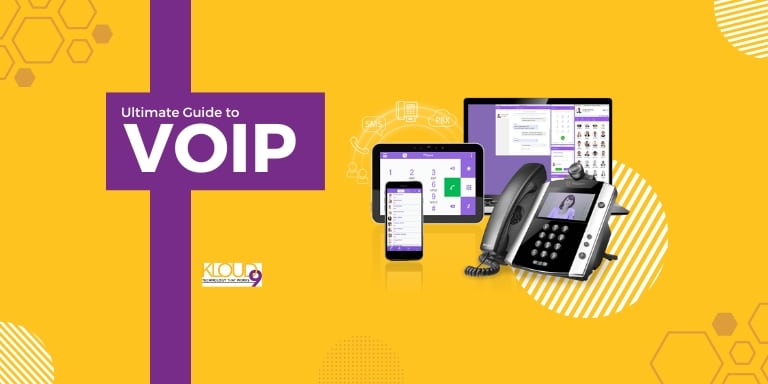In a world where communication is at the heart of personal and business interactions, Voice over Internet Protocol (VoIP) has emerged as a game-changer. VoIP has revolutionized how we make phone calls, enabling cost-effective, versatile, and feature-rich communication solutions. This comprehensive guide will explore everything you need to know about VoIP, from its basics to advanced applications.
What Is VoIP?
VoIP, short for Voice over Internet Protocol, is a technology that allows voice communication and multimedia sessions to be transmitted over the Internet. Instead of using traditional telephone networks, VoIP relies on packet-switched data networks, such as the Internet, to transmit voice, video, and other forms of communication.
How Does VoIP Work?
VoIP converts analog audio signals into digital data packets, which can be transmitted over the Internet or other data networks. These packets are transmitted in real-time, allowing for smooth and efficient communication. The digital data is converted back into analog audio signals at the receiving end so the recipient can hear the voice on the other end of the call.
Advantages of VoIP
VoIP offers many advantages over traditional phone systems, making it an attractive choice for individuals and businesses.
1. Cost Savings
One of the most significant advantages of VoIP is cost savings. VoIP calls are typically much cheaper than traditional long-distance and international calls. Many VoIP providers offer unlimited calling plans at a fraction of the cost of traditional phone service.
2. Versatility
VoIP is highly versatile and can be used on various devices, including smartphones, tablets, computers, and even traditional landline phones, with the help of analog telephone adapters (ATAs). This versatility allows you to make and receive calls from anywhere with an internet connection.
3. Rich Features
VoIP services come with a wide range of features that enhance communication. These include voicemail, call forwarding, caller ID, video conferencing, and more. Businesses can benefit from advanced features like auto-attendants and call routing.
4. Scalability
VoIP systems are highly scalable, making them suitable for businesses of all sizes. You can easily add or remove users and lines as your business grows or changes without extensive infrastructure changes.
5. Integration
VoIP can integrate seamlessly with other communication and productivity tools. This includes email, instant messaging, and customer relationship management (CRM) systems. Such Integration enhances efficiency and collaboration within an organization.
Types of VoIP Services
VoIP services can be categorized into several types, depending on how they are implemented and used:
1. Residential VoIP
Residential VoIP is designed for individual consumers. It allows users to make calls over the Internet using their broadband connection. Popular residential VoIP providers include Skype, Google Voice, and Vonage.
2. Business VoIP
Business VoIP services are tailored to meet the communication needs of organizations. They offer features like virtual phone systems, conference calling, and advanced call routing. Prominent business VoIP providers include RingCentral, 8x8, and Zoom.
3. Mobile VoIP
Mobile VoIP applications, such as WhatsApp, Viber, and FaceTime, enable users to call using their smartphones over Wi-Fi or mobile data networks. These apps are popular for international calls and video conferencing.
4. Cloud-Based VoIP
Cloud-based VoIP services host all the necessary equipment and infrastructure off-site. This approach reduces the need for on-premises hardware and maintenance. Businesses can access their VoIP services from anywhere with an internet connection.
5. On-premises VoIP
In contrast to cloud-based VoIP, on-premises VoIP systems require organizations to maintain their equipment and infrastructure. This option provides more control over the system but may involve higher upfront costs.
Setting Up VoIP
To get started with VoIP, you'll need a few essential components:
1. Internet Connection
A stable and reliable internet connection is crucial for VoIP. High-speed broadband or fiber-optic connections are recommended to ensure the best call quality.
2. VoIP Service Provider
Choose a VoIP service provider that suits your needs for residential or business use. Research providers based on features, pricing, and customer reviews.
3. Hardware
A computer or smartphone with a VoIP app is sufficient for residential use. You may need IP phones or softphones (software-based phones) and other hardware like routers and switches for businesses.
4. Configuration
Follow the instructions provided by your VoIP service provider to configure your devices. You'll need to create user accounts, set up your phone numbers, and configure any additional features you require.
5. Testing
Conduct some test calls before relying on VoIP for essential calls to ensure everything works as expected. Check for voice quality and any potential connectivity issues.
Common VoIP Challenges and Solutions
While VoIP offers numerous benefits, being aware of potential challenges is essential.
1. Voice Quality
Voice quality can be affected by network congestion, latency, and packet loss. To ensure high-quality calls, use a reliable internet connection and consider your router's Quality of Service (QoS) settings to prioritize VoIP traffic.
2. Security
VoIP calls can be vulnerable to eavesdropping and hacking. Employ encryption protocols and use strong passwords to secure your VoIP system.
3. Emergency Services
Traditional phone lines automatically transmit your location to emergency services when you dial 911. VoIP services may not provide this feature by default, so ensure your VoIP provider offers E911 (Enhanced 911) services.
4. Power Outages
VoIP services may become unavailable during power outages if you rely on a local power source. Consider backup power options or a mobile VoIP solution.
5. Compatibility
Not all devices and hardware are compatible with VoIP. Ensure your chosen hardware and software meet your VoIP service provider's requirements.
The Future of VoIP
As technology continues to advance, VoIP is expected to evolve in several ways:
1. 5G Integration
The rollout of 5G networks will provide even faster and more reliable internet connections, further enhancing VoIP call quality and enabling new applications like augmented reality (AR) and virtual reality (VR) communication.
2. AI and Automation
Artificial intelligence (AI) and machine learning will play a significant role in VoIP, enabling real-time language translation, predictive call routing, and automated call transcription.
3. IoT Integration
VoIP will integrate with Internet of Things (IoT) devices, allowing for seamless communication between various connected devices, from smart home appliances to industrial machinery.
4. Improved Security
Security measures will continue to advance to protect VoIP calls from evolving threats. Biometric authentication and advanced encryption protocols will become more prevalent.
Conclusion
In conclusion, VoIP has transformed communication, offering cost-effective, feature-rich, and versatile solutions for individuals and businesses. To leverage the full potential of VoIP, it's crucial to understand its advantages, choose the right type of service, and set up your system.





You must be logged in to post a comment.